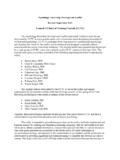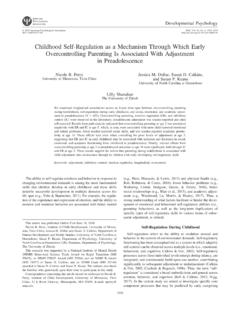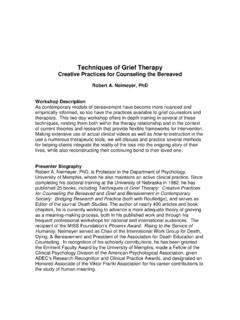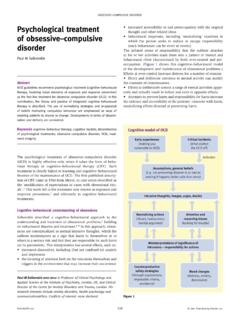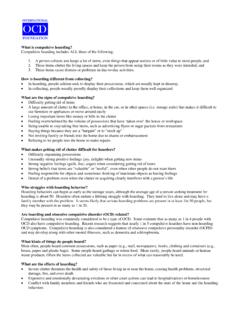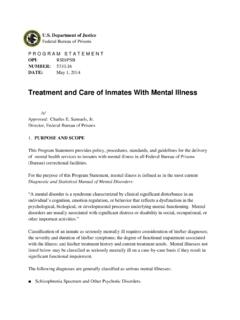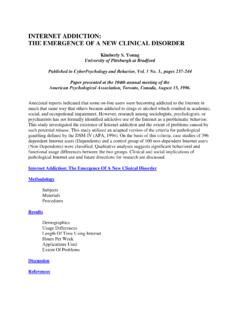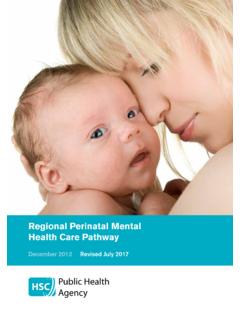Transcription of AMERICAN PSYCHOLOGICAL ASSOCIATION Psychology …
1 Psychology and AgingContentsWhat Is Psychology ?2 What Is Geropsychology?2 The Growing Need for PsychologicalServices for Older Adults 2 The Interface Between Physical andMental Health Care2 Policy Recommendations To ImproveMental Health Care for Older Americans3 How Psychologists Address the Needs ofOlder Adults Some Examples4 For More Information About Psychology and Aging7 PsychologistsMake a Significant ContributionAddressing Mental Health Needs of Older 65 years of age and older are the fastest growing segment of the population. An increasing number of older adults are immigrants or members of ethnic or racial minority groups. More than 5million older adults were below the poverty level or classified as nearpoor in 2001. Most older adults enjoy good mental health. However, it is anticipatedthat the number of older adults with mental and behavioral health prob-lems will almost quadruple, from 4 million in 1970 to 15 million in health disorders, including anxiety and depression, adverselyaffect physical health and ability to function, especially in older late-life problems that can result in depression and anxiety includecoping with physical health problems, caring for a spouse with dementiaor a physical disability, grieving the death of loved ones, and managingconflict with family these problems and treating often overlooked mental health conditions results in decreased emotional suffering, improved physicalhealth, lessened disability, and a better quality of life for older adults and their families.
2 Increasing access to mental health services for olderadults will reduce health care expenditures by lowering the frequency of primary care visits, medical procedures, and medication play a significant role in addressing the mental health needsand supporting the strengths of our growing population of older , psychologists provide more than 50,000 hours of care eachweek to older adults, and 70% of practicing psychologists provide someservices to older adults. Studies show that the majority of students in psy-chology doctoral training are interested in working with and expect toprovide clinical services to older adults during their provide services to older adults in a variety of settings,including health care facilities, community-based private or group practices, and places where older adults reside in their homes, long-term-care and assisted-living facilities, and hospices.
3 Psychologists workboth independently and as members of interdisciplinary teams. As teammembers, psychologists collaborate with a variety of professionals,including medical and other mental health care services providers, toensure comprehensive Is Psychology ? Psychology is the study of the mind and behavior. Psychology is unique in that it is both a service-oriented health care profession and a field of scientific research. Hence, the roles of thepsychologist are many researcher, educator, licensed health care provider, and policy are highly trained professionals their education involves a median of 7 years ofeducation and training beyond an undergraduate Is Geropsychology?Geropsychology is a field within Psychology devoted to the study of aging and the provision of clinical services for older adults. As researchers, geropsychologists expand knowledge of the normal aging process and design and test PSYCHOLOGICAL interventions that address problemsthat commonly arise as people age.
4 As health care practitioners, psychologists help older persons and their families overcome problems, enhance well-being, and achieve maximumpotential during later Growing Need for PSYCHOLOGICAL Services for Older Adults The demand for mental health practitioners with expertise in older adult care will expand as the older population grows. Demand for mental health services is expected to rise as large cohorts of middle-aged individuals who are more accepting of mental health services than the current generation of older people move into old age. Researchers estimate that almost two-thirds of older adults with a mental disorder do not receive needed services. This problem is particularly acute in rural and underserved groups, such as those living in poverty and some ethnic and racial groups. Research suggests that a majority of older adults would want to be treated should they become depressed.
5 When given a choice for the treatment of depression, older adults often prefer PSYCHOLOGICAL services to antidepressant medication. Older adults report feeling comfortable receiving mental health services from qualified mental health Interface Between Physical and Mental Health Care Studies indicate that 50-70% of all primary care medical visits are related to PSYCHOLOGICAL factors such as anxiety, depression, and stress. In rural and underserved areas, it may be that primary care medical services are the only health care available. Physical and mental health affect each other. For example, older adults with medical problemssuch as heart disease have higher rates of depression than those who are medically well. Conversely, untreated depression in an older person with heart disease negatively affects the outcome of the disease.
6 Even mild depression lowers immunity and may compromise a person's ability to fight infections and Depression has a powerful negative impact on ability to function, resulting in high rates of disability. The World Health Organization projects that by the year 2020, depression will remain a leading cause of disability, second only to cardiovascular disease. Recognition and treatment of mental health conditions in the medically ill may be especially difficult. As most older adults have one or more chronic medical conditions, psychologists' skills are particularly useful in diagnosis and treatment . Integration and coordination of care by geropsychologists with primary care professionals have been shown to decrease the frequency of older adults' primary care visits and use of Recommendations To Improve Mental Health Care forOlder Americans Enhance opportunities for professional training in the Psychology of aging at the doctoral and postdoctoral levels of education to address the growing number of older adults in need of mental and behavioral health services.
7 Expand basic and applied behavioral research at the National Institute of Mental Health and the National Institute on Aging. Increase funding for research training in geropsychology and for the widespread dissemination of evidence-based PSYCHOLOGICAL treatment for mental healthproblems of older adults. Increase the early identification and treatment of older adults with mental health problems through outreach and the provision of services offered in places older adults frequent, such as primary care settings, congregate meal and senior centers, residential settings, libraries, and other community sites. Support legislation to increase the availability of and access to effective mental health services for older adults. Barriers to treatment include financial costs; lack of parity between reimbursement of health vs. mental health services; poor recognition and diagnosis of mental health conditions among older adults; lack of programs focusing on older adult mental health issues; reluctance of primary care providers to refer to mental health professionals; transportation; living in a rural or underserved area; and stigma.
8 Increase funding through Medicaid, the Older Americans Act, and the Community Mental Health Services Block Grant to expand the availability of mental health and related supportiveservices to older adults. Increase coordination of mental and physical health care. Because of the often-complex interplay of physical and mental health problems in older adults, interdisciplinary care is needed to provide optimal Psychologists Address the Needs of Older Adults Some ExamplesResearchPsychologists are at the forefront of research on questions related to health and aging. Why are most older adults successful in adapting to the stressors of late life, while others become suicidal? Why do most older adults remain mentally sharp, while others have memory problems? Research on the aging brain provides clues to the risks and protective factors for mental disorders across the life the often-complex mental and physical health problems of older adults, health care providers and families often turn to psychologists because of their skills in PSYCHOLOGICAL and neuropsychological assessment.
9 Psychologists are also the leading scientists responsible for the development of diagnostic tools. Psychologists have the necessary expertise to assess and differentiate between disorders such as dementia, depression, anxiety, delirium, adjustment reactions, side effects from medications, or combinations of these problems. The legal profession looks to psychologists to help determine whether older adults have the capacity to manage their own with younger adults, a variety of mental health disorders, such as anxiety and depression, affect older adults. Stressors common in late life significantly affect the health and independence of older adults. Life stressors include adapting to and coping with late-life transitions, grief, poverty, multiple medical conditions, functional limitations, cognitive changes, chronic pain, and care for an infirm family use PSYCHOLOGICAL interventions, including various psychotherapies, to help older adults deal with mental health disorders and late-life stressors.
10 The most common PSYCHOLOGICAL interventions include cognitive behavioral, interpersonal, and psychodynamic psychotherapy; behavior modification and disease management strategies; cognitive training techniques; and environmental modification. Alone or in combination with psychiatric medications, PSYCHOLOGICAL interventions have been shown to be effective in the treatment of many mental health disorders. The availability of nonpharmacological treatments for mental health problems is especially important for older adults. This is because they are often on multiple medications for physical health problems, are more prone to certain adverse side effects of psychiatric medications than younger individuals, and, as noted, often prefer psychotherapy to psychiatric conduct research on and provide treament for a wide range of mental health disorders and life problems that affect older adults including the following.



